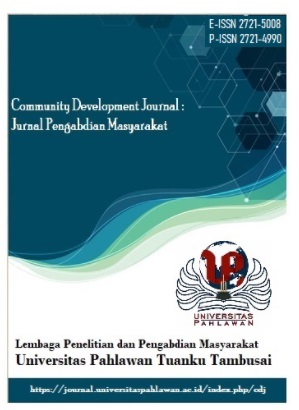MORAL EDUCATION FOR EARLY CHILDHOOD AT SHEJA SCHOOL USING THE ROLE MODEL METHOD
DOI:
https://doi.org/10.31004/jrpp.v7i3.33259Keywords:
Children’s Moral Development, Role MethodAbstract
This study was motivated by the low effectiveness of teachers in providing moral education to support the moral development of early childhood children in Group B at SSHEJA School. The aim of this research is to enhance the moral development of children through the role model method at PAUD SHEJA School in Bukit Mengkirai Village, Gebang Subdistrict, Langkat Regency. The subjects of this study were 10 children at PAUD SHEJA School. The focus of this research is to investigate whether the role model method can improve the moral development aspects of children at PAUD SHEJA School. The method used in this study was direct instruction with the classroom action research (CAR) model, which involved planning, implementing actions, observing learning outcomes, and reflecting over three cycles. The data analysis results indicate that the observation and assessment of the learning plan yielded the following outcomes: first, Cycle I achieved a score of 46.6% from 3 categories and 9 observational aspects; second, cycle II achieved a score of 70% from 3 categories and 13 observational aspects, categorized as moderate; third, cycle III achieved a score of 90% from 3 categories and 13 observational aspects, categorized as good. The results of the learning implementation from the activities of teachers and children were: cycle I obtained a score of 43%, cycle II achieved a score of 73%, categorized as moderate, cycle III obtained a score of 86%, categorized as good. The assessment of learning outcomes, specifically the improvement in children's moral development, showed: cycle I reached a percentage of 50%, cycle II achieved a class percentage of 61.4%, cycle III reached a percentage of 85.7%. Based on the research findings and discussion, it can be concluded that the moral development of children in Group B at PAUD SHEJA School, Bukit Mengkirai Village, Gebang Subdistrict, Langkat Regency, can be enhanced through the role model method. Utilizing the role model method can effectively strengthen the moral development of children, resulting in optimal improvement. It is recommended that future researchers explore and develop other teaching methods or instructional media that could be more effective in enhancing learning outcomes.References
Abdul Mujib, & Jusuf Mudzakkir. (2008). Ilmu Pendidikan Islam. Jakarta: Kencana Prenada Media Group.
Ali Nugraha, dkk. (2015). Pedoman Pengelolaan Pembelajaran Pendidikan Anak Usia Dini. Jakarta: Direktorat Pembinaan Pendidikan Anak Usia Dini.
Ahmad Nawawi. (2010). Pentingnya Pendidikan Nilai Moral Bagi Generasi Penerus. Jurusan Pendidikan Luar Biasa Fakultas Ilmu Pendidikan Universitas Pendidikan Indonesia Bandung.
Farida Agus Setiawati (2006). Pendidikan Moral Dan Nilai-Nilai Agama Pada Anak Usia Dini: Bukan Sekedar Rutinitas. Paradigma, No. 02 Th. I p. 41-48.
Hapidin & Yenina. (2016). Pengembangan Model Permainan Tradisional Dalam Membangun Karakter Anak Usia Dini. Jurnal Pendidikan Usia Dini Volume 10 Edisi 2, November 2016).
Husni Rahim and Maila Dinia Husni Rahiem. (2012). The Use Of Stories As Moral Education For Young Children. International Journal of Social Science and Humanity, Vol. 2, No. 6, November 2012.
John Siraj-Blatchford. (2009). Editorial: Education for Sustainable Development in Early Childhood. International Journal of Early Childhood, Vol. 41, No. 2, 2009.
Kristin A. Termini & Jeannie A. Golden. Moral Behaviors: What Can Behaviorists Learn from the Developmental Literature?. International Journal of Behavioral Consultation and Therapy Volume 3, No. 4, 2007, p. 477.
Masitoh, dkk. (2008). Strategi Pembelajaran TK. Jakarta: Universitas Terbuka. Menteri Pendidikan Nasional. (2009). Salinan Peraturan Menteri Pendidikan
Nasional No. 58 Tahun 2009, tentang Standar Pendidikan Anak Usia Dini.
R. Andi Ahmad Gunadi. (2013). Membentuk Karakter Melalui Pendidikan Moral Pada Anak Usia Dini Di Sekolah Raudhatul Athfal (R.A) Habibillah. Jurnal Ilmiah Widya Volume 1 Nomor 2 Juli-Agustus 2013 p. 85 – 91.
Republik Indonesia. (2003). Undang-Undang Republik Indonesia Nomor 20 Tahun 2003 Tentang Sistem Pendidikan Nasional.
Sapendi. (2015). Internalisasi Nilai-nilai Moral Agama Pada Anak Usia Dini. At- Turats, Vol.9 Nomor 2 Desember Tahun 2015.
Downloads
Published
How to Cite
Issue
Section
License
Copyright (c) 2024 Sery Sigalingging

This work is licensed under a Creative Commons Attribution-ShareAlike 4.0 International License.






